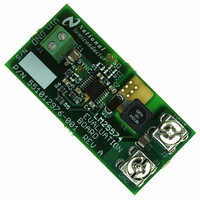LM25574EVAL National Semiconductor, LM25574EVAL Datasheet - Page 10

LM25574EVAL
Manufacturer Part Number
LM25574EVAL
Description
BOARD EVALUATION FOR LM25574
Manufacturer
National Semiconductor
Series
PowerWise®, SIMPLE SWITCHER®r
Specifications of LM25574EVAL
Main Purpose
DC/DC, Step Down
Outputs And Type
1, Non-Isolated
Voltage - Output
5V
Current - Output
500mA
Voltage - Input
7 ~ 42V
Regulator Topology
Buck
Frequency - Switching
300kHz
Board Type
Fully Populated
Utilized Ic / Part
LM25574
Lead Free Status / RoHS Status
Not applicable / Not applicable
Power - Output
-
Other names
*LM25574EVAL
www.national.com
Error Amplifier and PWM
Comparator
The internal high gain error amplifier generates an error signal
proportional to the difference between the regulated output
voltage and an internal precision reference (1.225V). The
output of the error amplifier is connected to the COMP pin
allowing the user to provide loop compensation components,
generally a type II network, as illustrated in Figure 1. This
network creates a pole at DC, a zero and a noise reducing
high frequency pole. The PWM comparator compares the
emulated current sense signal from the RAMP generator to
the error amplifier output voltage at the COMP pin.
FIGURE 5. Simplified Oscillator Block Diagram and SYNC I/O Circuit
10
RAMP Generator
The ramp signal used in the pulse width modulator for current
mode control is typically derived directly from the buck switch
current. This switch current corresponds to the positive slope
portion of the output inductor current. Using this signal for the
PWM ramp simplifies the control loop transfer function to a
single pole response and provides inherent input voltage
feed-forward compensation. The disadvantage of using the
buck switch current signal for PWM control is the large leading
edge spike due to circuit parasitics that must be filtered or
blanked. Also, the current measurement may introduce sig-
nificant propagation delays. The filtering, blanking time and
propagation delay limit the minimum achievable pulsewidth.
In applications where the input voltage may be relatively large
in comparison to the output voltage, controlling small
pulsewidths and duty cycles is necessary for regulation. The
LM25574 utilizes a unique ramp generator, which does not
actually measure the buck switch current but rather recon-
structs the signal. Reconstructing or emulating the inductor
current provides a ramp signal to the PWM comparator that
is free of leading edge spikes and measurement or filtering
delays. The current reconstruction is comprised of two ele-
ments; a sample & hold DC level and an emulated current
ramp.
20214107










